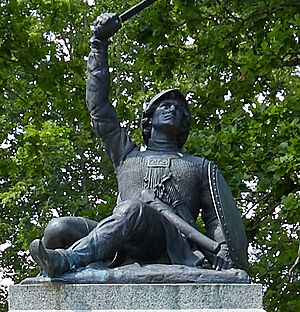Lembitu facts for kids
Quick facts for kids Lembitu |
|
|---|---|
| Elder of Sakala | |

Monument to Lembitu at Suure-Jaani, Estonia.
|
|
| Reign | Until 21 September 1217 |
| Successor | Unnepewe, his brother |
| Born | 12th century |
| Died | 21 September 1217 Near Viljandi |
| Issue | One or several sons |
Lembitu (also known as Lembit in Estonian) was a brave and important leader from ancient Estonia. He lived in the early 1200s and led his people, the Estonians, in battles against German crusaders. He is one of the few Estonian leaders from that time whose story we know, mostly from an old book called the Livonian Chronicle of Henry.
Lembitu was an "elder" from Sakala County, which meant he was a respected leader in his region. He is first mentioned in old writings around the year 1211.
Lembitu's Early Actions
In 1211, troops led by Lembitu attacked a group of missionaries in Sakala. He also led a raid all the way to Pskov, which was then a town belonging to the Novgorod Republic. This showed his strength and determination.
Capture and Release
In 1215, Lembitu's strong fort, called Lehola (near today's Suure-Jaani), was captured by the Germans. Lembitu himself was taken prisoner. However, he was later set free in 1217.
Uniting the Estonians
After his release, Lembitu worked hard to bring different Estonian groups together. His goal was to create a strong army that could stand up to the German forces. He managed to gather a large army of about 6,000 Estonian men from various regions.
The Final Battle
Lembitu led this united Estonian army into a major battle. Sadly, he was killed during this fight, known as the Battle of St. Matthew's Day, in September 1217. This battle took place near Viljandi.
Lembitu is remembered as a hero who fought for the freedom of his people.
 | Bessie Coleman |
 | Spann Watson |
 | Jill E. Brown |
 | Sherman W. White |

